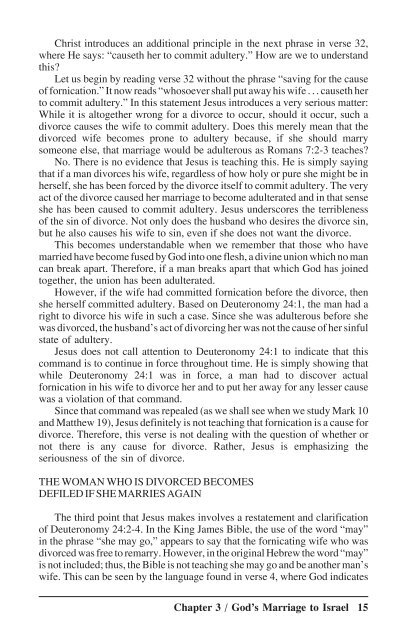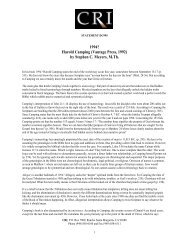What God Joined Together - Family Radio
What God Joined Together - Family Radio
What God Joined Together - Family Radio
Create successful ePaper yourself
Turn your PDF publications into a flip-book with our unique Google optimized e-Paper software.
Christ introduces an additional principle in the next phrase in verse 32,<br />
where He says: “causeth her to commit adultery.” How are we to understand<br />
this<br />
Let us begin by reading verse 32 without the phrase “saving for the cause<br />
of fornication.” It now reads “whosoever shall put away his wife . . . causeth her<br />
to commit adultery.” In this statement Jesus introduces a very serious matter:<br />
While it is altogether wrong for a divorce to occur, should it occur, such a<br />
divorce causes the wife to commit adultery. Does this merely mean that the<br />
divorced wife becomes prone to adultery because, if she should marry<br />
someone else, that marriage would be adulterous as Romans 7:2-3 teaches<br />
No. There is no evidence that Jesus is teaching this. He is simply saying<br />
that if a man divorces his wife, regardless of how holy or pure she might be in<br />
herself, she has been forced by the divorce itself to commit adultery. The very<br />
act of the divorce caused her marriage to become adulterated and in that sense<br />
she has been caused to commit adultery. Jesus underscores the terribleness<br />
of the sin of divorce. Not only does the husband who desires the divorce sin,<br />
but he also causes his wife to sin, even if she does not want the divorce.<br />
This becomes understandable when we remember that those who have<br />
married have become fused by <strong>God</strong> into one flesh, a divine union which no man<br />
can break apart. Therefore, if a man breaks apart that which <strong>God</strong> has joined<br />
together, the union has been adulterated.<br />
However, if the wife had committed fornication before the divorce, then<br />
she herself committed adultery. Based on Deuteronomy 24:1, the man had a<br />
right to divorce his wife in such a case. Since she was adulterous before she<br />
was divorced, the husband’s act of divorcing her was not the cause of her sinful<br />
state of adultery.<br />
Jesus does not call attention to Deuteronomy 24:1 to indicate that this<br />
command is to continue in force throughout time. He is simply showing that<br />
while Deuteronomy 24:1 was in force, a man had to discover actual<br />
fornication in his wife to divorce her and to put her away for any lesser cause<br />
was a violation of that command.<br />
Since that command was repealed (as we shall see when we study Mark 10<br />
and Matthew 19), Jesus definitely is not teaching that fornication is a cause for<br />
divorce. Therefore, this verse is not dealing with the question of whether or<br />
not there is any cause for divorce. Rather, Jesus is emphasizing the<br />
seriousness of the sin of divorce.<br />
THE WOMAN WHO IS DIVORCED BECOMES<br />
DEFILED IF SHE MARRIES AGAIN<br />
The third point that Jesus makes involves a restatement and clarification<br />
of Deuteronomy 24:2-4. In the King James Bible, the use of the word “may”<br />
in the phrase “she may go,” appears to say that the fornicating wife who was<br />
divorced was free to remarry. However, in the original Hebrew the word “may”<br />
is not included; thus, the Bible is not teaching she may go and be another man’s<br />
wife. This can be seen by the language found in verse 4, where <strong>God</strong> indicates<br />
Chapter 3 / <strong>God</strong>’s Marriage to Israel<br />
15




